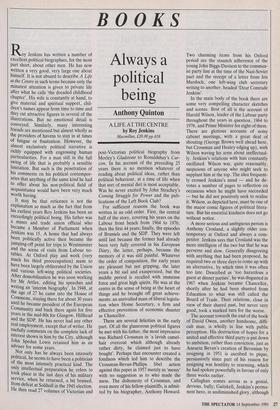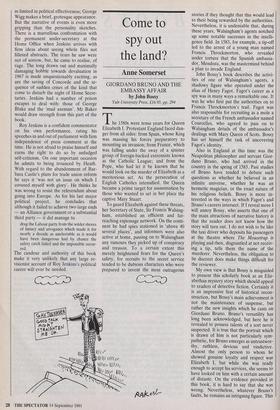BOOKS
Always a political being
Anthony Quinton
A LIFE AT THE CENTRE by Roy Jenkins
Macmillan, £20.00 pp.658
Roy Jenkins has written a number of excellent political biographies, for the most part short, about other men. He has now written a very good, very large one about himself. It is not absurd to describe A Life at the Centre in such terms because only the minutest attention is given to private life after what he calls 'the dreaded childhood chapter'. His wife is constantly at hand, to give material and spiritual support, chil- dren's names appear from time to time and they cut attractive figures in several of the illustrations. But no emotional detail is conveyed. Similarly, many interesting friends are mentioned but almost wholly as the providers of havens to stay in at times of fatigue or frustration. However, the almost exclusively political narrative is richly equipped with engrossing human particularities. For a man still in the full swing of life that is probably a sensible limitation. But such is the penetration of his comments on his political contempor- aries that anything of the same kind he had to offer about his non-political field of acquaintance would have been very much worth having. It may be that reticence is not the explanation so much as the fact that from his earliest years Roy Jenkins has been an exceedingly political being. His father was a miner and trade union official who became a Member of Parliament when Jenkins was 15. A home that had always been politically active then became the Jumping-off point for trips to Westminster and the scene of visits from Labour no- tables. At Oxford play and work (very much his third preoccupation) seem to have been largely obliterated by the Union and various left-wing political societies. After demobilisation he was soon working for Mr Attlee, editing his speeches and writing an 'interim biography'. In 1948, at the age of 27 he came into the House of Commons, staying there for about 30 years until he became president of the European Community and back there again for five years in the mid-80s for Glasgow, Hillhead and the SDP. He has never had any other real employment, except that of writer. He ruefully comments on the complete lack of interest shown in him by the City, although John Spedan Lewis retained him as an adviser for some years. Not only has he always been intensely political, he seems to have been a politician of the most intensely practical kind. The only intellectual preparation he refers to took place in the last days of his military service, when he returned, a bit bruised, from defeat at Solihull in the 1945 election. He then read 27 volumes of Victorian and post-Victorian political biography from Morley's Gladstone to Ronaldshay's Cur- zon. In his account of the preceding 25 years there is no mention whatever of reading about political ideas, rather than political behaviour, at a time of life when that sort of mental diet is most acceptable. Was he never excited by John Strachey's Coming Struggle for Power and the pub- lications of the Left Book Club?
For sufficient reasons the book was written in an odd order. First, the central half of the story, covering his years on the Labour front bench from 1964 to 1976; then the first 44 years; finally, the episodes of Brussels and the SDP. They were left until last because the former had already been very fully covered in his European Diary, the latter, perhaps, because the memory of it was still painful. Whatever the order of composition, the early years are pleasant but not gripping, the later years a bit sad and exasperated, but the middle period is recalled with immense force and great high spirits. He was at the centre in the sense of being at the heart of things and he brought off great achieve- ments: an unrivalled mass of liberal legisla- tion when Home Secretary, a firm and effective prevention of economic disaster as Chancellor.
There are several felicities in the early part. Of all the glamorous political figures he met with his father, the most impressive was Richard Crossman in 'a lavish camel- hair overcoat which although already rather dirty, he claimed just to have bought'. Perhaps that encounter created a fondness which led him to describe the Crossman-Bevan-Phillips libel action against this paper in 1957 merely as 'messy' with no suggestion as to who made the mess. The dishonesty of Crossman, and even more of his fellow-plaintiffs, is admit- ted by his biographer, Anthony Howard. Two charming items from his Oxford period are the staunch adherence of the young John Biggs-Davison to the commun- ist party line at the time of the Nazi-Soviet pact and the receipt of a letter from Iris Murdoch, one left-wing club secretary writing to another, headed 'Dear Comrade Jenkins'.
In the main body of the book there are some very compelling character sketches and scenes. Best of all is the account of Harold Wilson, leader of the Labour party throughout the years in question, 1964 to 1976, and Prime Minister for eight of them. There are glorious accounts of noisy cabinet meetings, with a great deal of shouting (George Brown well ahead here, but Crossman and Healey edging up), with Wilson waving his arms about ineffectual- ly. Jenkins's relations with him constantly oscillated. Wilson was, quite reasonably, suspicious of anyone who might seek to supplant him at the top. The idea frequent- ly crossed Jenkins's mind — and he de- votes a number of pages to reflection on occasions when he might have succeeded — but he did not positively seek to realise it. Wilson, as depicted here, must be one of the major comic figures of political litera- ture. But his essential kindness does not go without notice.
A more serious and ambiguous person is Anthony Crosland, a slightly older con- temporary at Oxford and always a com- petitor. Jenkins says that Crosland was the more intelligent of the two but that he was perverse and slow. Generally disagreeing with anything that had been proposed, he required two or three days to come up with an alternative, by which time it was often too late. Described as 'too hazardous a guest at dinner parties', he was disgusted in 1967 when Jenkins became Chancellor, shortly after he had been shunted from Education to what was still called the Board of Trade. Their relations, close in view of their shared past, but never very good, took a marked turn for the worse.
The account towards the end of the book of David Owen, another handsome, diffi- cult man, is wholly in line with public perception. His destruction of hopes for a united and effective third party is put down to ambition, rather than conviction, just as Aneurin Bevan's creation of Bevanism by resigning in 1951 is ascribed to pique, persuasively since part of his reason for resigning was hostility to rearming, which he had spoken powerfully in favour of only three weeks earlier.
Callaghan comes across as a genial, devious, bully; Gaitskell, Jenkins's perma- nent hero, in undiminished glory, although as limited in political effectiveness; George Wigg makes a brief, grotesque appearance. But the narrative of events is even more gripping than the personality sketches. There is a marvellous confrontation with the permanent under-secretary at the Home Office when Jenkins arrives with firm ideas about seeing whole files not filleted abstracts. The tears he saw were not of sorrow, but, he came to realise, of rage. The long drawn out and maximally damaging hobble towards devaluation in 1967 is made unquestionably exciting, as are the saving of Concorde and the se- quence of sudden crises of the kind that come to disturb the night of Home Secre- taries. Jenkins had a number of prison escapes to deal with: those of George Blake and the 'mad axeman'. Mr Baker would draw strength from this part of the book.
Roy Jenkins is a confident commentator on his own performance, rating his speeches in and out of parliament with firm independence of press comment at the time. He is not afraid to praise himself and earns the right to do so by unfudged self-criticism. On one important occasion he admits to being trounced by Heath. With regard to the abandonment of Bar- bara Castle's plans for trade union reform he says it 'was not an issue on which I covered myself with glory'. He thinks he was wrong to resist the referendum about going into Europe. As for his last major political project, he concludes that although it failed to achieve two large ends — an Alliance government or a substantial third party — it did manage to drag the Labour party from the wilder shores of lunacy and arrogance which made it for nearly a decade as unelectable as it would have been dangerous had by chance the safety catch failed and the impossible occur- red.
The candour and authority of this book make it very unlikely that any large re- visionist account of Roy Jenkins's political career will ever be needed.



















































 Previous page
Previous page